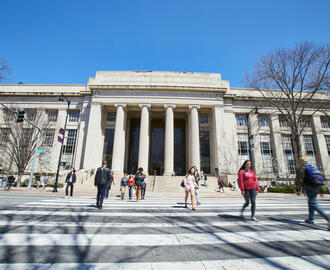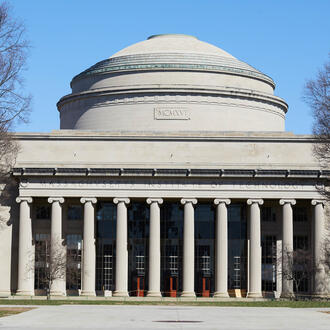MIT Executive MBA
Embracing a growth mindset
Siddharth Nagarkatti is Senior Vice President, Business and Payments Analytics at Bank of America and a member of the MIT Executive MBA Class of 2017.
Disclaimer: The following answers are all Siddharth's personal opinions and do not represent the view of his employer.
Siddharth Nagarkatti, EMBA '17
You often spoke about having a growth mindset and how it had affected your career choices when you were in the program. Can you share examples of how it's still influencing your professional journey?
As an MIT EMBA student, the concept of a 'growth mindset' really resonated with me. I vividly remember a discussion with my learning group when it just clicked – to evolve and thrive in my career, I needed to shift from a fixed to a growth mindset.
Since then, it has been a driving force in my career. It's not just about believing in the potential for growth; it is about actively pursuing it through sharing, collaboration, innovation, feedback, and embracing setbacks as opportunities to learn and grow.
When I joined the bank in 2017, my role focused on developing actionable client insights for the wealth management business, catering mainly to affluent clients. But I quickly realized that to make a bigger impact, I needed a broader understanding of our entire client base and organizational dynamics. That is why I made it a priority to delve into other business lines, embrace new technologies, and collaborate closely with senior leaders to drive meaningful change.
I centered my efforts on three key areas, all while staying true to my growth mindset:
- Expanding domain knowledge: I actively pursue challenging projects that span multiple business lines. This approach not only deepens my understanding of our diverse client base but also sheds light on how different parts of the organization interact and collaborate.
- Strengthening my technical skills: Whether it is diving into online lectures (often on my treadmill) or experimenting with new platforms and tools like AI and causal machine learning (ML), I am constantly pushing myself to stay ahead of the curve. This commitment to ongoing learning has enabled innovation and boosted productivity in our team.
- Sharpening my communication: Effective communication is crucial, especially when working with busy senior executives. I have honed my ability to distill complex ideas into concise actionable insights that resonate with my audience. By focusing on what matters most to them, I can drive real change and garner support for our initiatives.
“Growth mindset” remains my north star. It is keeping me hungry for knowledge, eager to innovate, and always ready to tackle whatever challenges come my way.
Your work focuses on data, analytics, and insights. How has what you learned in the MIT Executive MBA aided you?
My MIT EMBA journey was transformative, enabling me to develop invaluable skills and strategies that continue to shape my approach to data analytics and insights delivery.
My mentor at the bank, an MIT alum, told me, "If you want to get anything done, it is through people. It is not just about what you know." The MIT EMBA's emphasis on being "hard-headed about soft skills" provided me with a solid foundation to navigate complex organizational dynamics and collaborate effectively with partners to drive meaningful outcomes. It instilled in me the mindset that true value lies in insights that not only inform but also drive change, ultimately serving our clients better.
Drawing from my EMBA experience, I employ three guiding strategies:
I continue to build a trusted network and rely on them for knowledge, different perspectives, and to be a sounding board. I make time for informal and in-person one-on-one conversations. These trusted relationships help me with "sensemaking" and developing a shared understanding, leading to better insights. It also opens doors to new opportunities and showcases my thought leadership in cognitive bias, decision-driven data analytics, and storytelling with data.
I engage early and often with partners and stakeholders on deliverables so we can make swift adjustments based on their feedback and get buy-in. This preserves timelines and ensures alignment.
I drive change by applying the three lenses – strategic design, political, and cultural – to help identify root causes of challenges and determine the most effective path to drive change throughout the organization.
These strategies have equipped me to navigate complexities in data analytics and insights delivery, drive impactful change within my organization, and deliver value-added solutions and positive client experiences.
In your opinion, how will AI and machine learning impact your industry?
AI and machine learning are not new to the banking industry. They are expected to impact the industry in three major ways:
- Improving Customer Experience: AI and machine learning will enable personalized and seamless experiences for customers by anticipating their needs, providing tailored product recommendations, and offering proactive support.
- Enhancing Operational Efficiency: These technologies will streamline bank processes, such as fraud detection, risk management, and compliance, through automation and optimal allocation of resources.
- Advancing Risk Management: Machine learning algorithms will analyze complex data patterns to identify potential credit defaults, detect fraudulent activities, and assess the creditworthiness of borrowers more accurately.
A complementary question is the impact of AI on individuals. Many ask the question, “how will AI change my job” – a better question maybe, “how will I change my job with AI?”
As a Class of 2017 alum of the MIT EMBA, what's something new you learned when you returned to campus for this year's January Executive Electives?
I always look forward to the intellectually invigorating experience of returning to campus for the January Executive Electives. I had the privilege of participating in Zeynep Ton's Management of Services class earlier this year, which proved to be both enlightening and thought-provoking.
Zeynep’s passion for creating “good jobs” is truly infectious, and her class challenged my biases in unexpected ways.
She shared that a living wage is integral to preserving the dignity of work, underscoring the importance of fair compensation in fostering a positive work environment.
She also established positions around the sustainability of the pay raise. For example, simply increasing pay is not enough; it must be accompanied by efforts to increase productivity to ensure long-term sustainability, and operational excellence is key to driving higher productivity and maintaining financial stability. Finally, Zeynap shared that solutions to complex issues such as workforce management are found within systems, not isolated silos. Her holistic approach underscores the interconnectedness of various factors influencing workplace dynamics.
As I reflect on these insights, I am proud to be part of a bank that has publicly stated and is on a path to increasing its minimum wage to $25 by 2025. Zeynep’s teachings have reaffirmed the importance of such initiatives in creating a more equitable and sustainable future for all employees.
How do you stay connected with your classmates?
The EMBA ‘17s are a very tight-knit group, even seven years after graduation. The “Fireside Chats” during the program served to strengthen our bonds. Every time we meet, it seems like we are picking up from where we left off. We lean on each other for guidance and support on matters of work and life.
I stay connected with my classmates mainly through text messages and phone calls, and the occasional pop-up dinner when a classmate is visiting the Boston area. The big get-togethers happen at events hosted by the MIT Executive Degree Programs office and during Jan Electives.
Knowing that any classmate is a phone call away is very comforting – and every time we connect always brings joy!
What's one piece of advice you would share with a prospective student?
I know this is a tall ask: practice being vulnerable and ask for help. Start within your learning group and expand out to your classmates and into the alumni network. Embrace vulnerability as a tool for growth. Asking for help is not a sign of weakness but a demonstration of your commitment to learning and improvement.
Your classmates and alumni network are valuable resources. Each student in your class is uniquely accomplished, and everyone is striving for personal and professional growth.
Remember, the person best positioned to help an EMBA student may be another EMBA student or alum!



